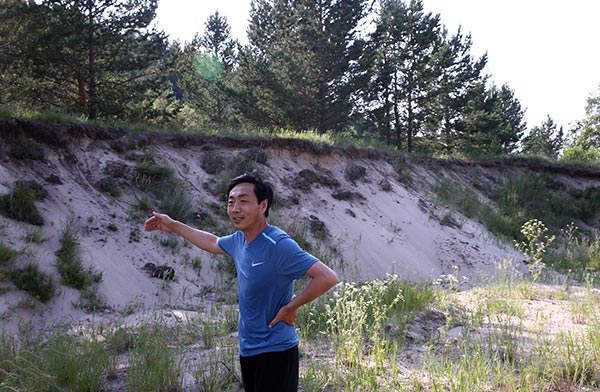 |
|
Chen Zhiqing, Saihanba deputy director. [Photo by Zou Hong/China Daily] |
Life in isolation
Liu, like almost all of his work mates, is inured to hardship, to the point of stoicism, and he gives little away, even as I press him for details. But when a reporter with me asks about his daughter, the eyes of the stout 51-year-old water up and he begins to cry.
"I never got to spend time with her when she was little," he sobbed.
After talking to many people here, I realize that if there were a shred of consolation for Liu over his years of remorse for that forced neglect, it was thin indeed: knowing that many of his work mates were wracked with the same kind of guilt.
"In theory we can go home to the town center not far away-by that I mean two hours by bus-once a week, but in reality, everyone must be here continuously for three months twice a year, during the spring and autumn fire seasons," Liu said.
"Spring used to be a big tree-planting season, and to some extent still is, but now there's little vacant land, so no one's going to leave, and in winter all roads down the mountain in effect are blocked by snow."
Changes have taken place since then, but not big enough to prevent Yu Lei, 36, from feeling the same as his parents did decades ago.
"I came-I should say 'came back'-to Saihanba in 2006, after graduating from the Beijing Institute of Technology and have worked in the forestry's fire-monitoring center since then."
When Yu's grandfather came to Saihanba in 1962 his father was just 2.
"My father went on to work at Saihanba, and so did all my uncles. Altogether I have 14 relatives working here, me being the latest addition."
Yu married in 2008, and his wife now works at Saihanba, too. The couple have a daughter, 8.
"A few weeks ago, when I last went home, my mother, who is now taking care of my daughter, told me that the girl got the correct answer to a very difficult math question, but no one else in her class did," he said.
"I asked how she did it, but she said she couldn't remember.… I felt I was missing out on her growing up, just as my parents did, to their own regret."
Sadly, Yu has become an object of envy to many of his peers-children whose parents also once worked at Saihanba and whom Yu grew up with.
"I wanted to come back and they welcomed me. This has not happened to every one."
Chen, the deputy director, knows more about this.
"In 2014 we recruited 130 young people, of whom about 40 have already left," he said.